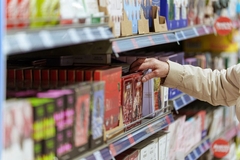
- Industry news
Industry news
- Category news
Category news
- Reports
- Key trends
- Multimedia
- Journal
- Events
- Suppliers
- Home
- Industry news
Industry news
- Category news
Category news
- Reports
- Key trends
- Multimedia
- Events
- Suppliers
MEPs visit Ukraine-Polish border in bid to liberate wheat as costs continue to rise
.jpg)
16 Jun 2022 --- The efforts to free up 20 million metric tons of grain trapped in Ukrainian silos continue, as a delegation from the EU Committee on Agriculture and Rural Development is traveling to the Ukraine-Poland border to assess the situation in person.
The situation is time sensitive as silos must be emptied before the August harvest; otherwise, the wheat will perish.
Countries worldwide are crossing their fingers hoping for a solution that will allow food corridors through the Black Sea, as surges in costs are forcing places like Egypt to increase their budgets for food imports by the billions.
The president of the European Commission, Ursula Von der Leyem, admitted that wheat exports from Ukraine are down to 200,000 to 1 million metric tons per month. Also down from the 5 million metric tons of wheat that could be exported by sea before the war in Ukraine.
The politicians will visit the Medyka (rail) and Korczowa (road) border in Poland “to assess the import of Ukrainian agricultural commodities and the potential for alternative routes.”
The MEPs will talk to Ukrainian business and trade representatives to exchange views on the capacity of storing agricultural products.
 20 million metric tons of grain have to be extracted from Ukraine before August’s harvest.An impossible challenge?
20 million metric tons of grain have to be extracted from Ukraine before August’s harvest.An impossible challenge?
Freight trains’ capacity to transport wheat is limited compared to ships, as one shipping container ship can carry about the same cargo load as 50 trains.
“Due to the Russian blockade of the Ukrainian Black Sea ports, grain exports have to be transported via road and rail,” reiterates Norbert Lins, chair of the delegation.
Meanwhile, according to Ukrainian authorities, Russia is seizing the opportunity to steal some of the unmoving wheat, accusing Russia of stealing over half a million metric tons of grain since the start of the conflict – worth over US$100 million.
Volodymyr Zelensky, Ukraine’s president, underscored the importance of opening sea routes by saying that “everything has to be done” to move grain by sea.
The war in Ukraine has already driven cereal prices to all-time-highs, with the FAO Cereal Price Index averaging 173.4 points, a 30% yearly increase.
Bureaucratic trap
At the start of June, Adina Vălean, the EU’s transport commissioner, highlighted that all the wheat had to leave the country in “less than three months.” To do this, she urged member states to increase inspection capacity and work day and night on train arrivals.
At the time, some convoys were being delayed up to 10 days for missing only one certificate.
“This is a huge infrastructural and bureaucratic challenge at the borders of Ukraine,” explains Lins.
“The aim of this fact-finding mission at the Polish-Ukrainian border is to see what the problems on the spot are and where help from the European side could be provided very quickly and in an uncomplicated manner,” he continues.
WTO summit inconclusive According to Ukraine, Russia has stolen half a million metric tons of wheat.
According to Ukraine, Russia has stolen half a million metric tons of wheat.
Members of the world trade body are reunited in Geneva, Switzerland, to try to reign in the rising food protectionism sentiment among food-insecure countries. Without wheat flowing from Ukraine, the meeting and its outcome become decisive for the global food trade.
WTO Director-General Ngozi Okonjo-Iweala decided to extend the meeting by one day and urged members to “be mindful that time is running out.”
The unanimity requirement for agreements is blocking, so far, a potential accord on open trade, with India rising as the main dissenter to a potential deal. The country is entrenched in a domestic food reserves regulation dispute with the WTO.
The delegate for India, Piyush Goyal, called for a deep reform and modernization of the WTO.
By Marc Cervera










